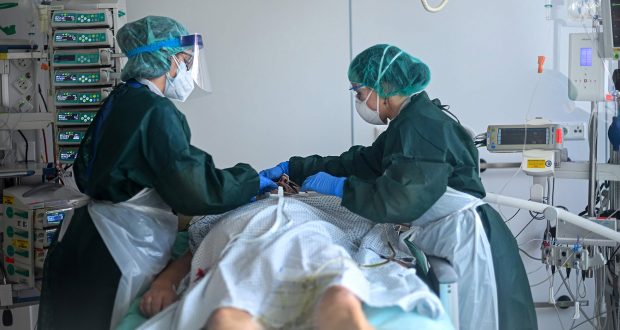The International Council of Nurses (ICN) has released figures showing that as many nurses have died form COVID-19 worldwide as died during World War I.
The latest numbers show that 1,500 nurses have died since the pandemic began, the same as WWI, up from 1097 in August.
Globally, current numbers of the virus stand at 46.8 million, with 31.2 recovered, and 1.2 million deaths, or approximately 2.6 per cent. ICN suggests that 10 per cent of all cases are healthcare workers.
The nurse death figures were collated from only 44 of the world’s 195 countries, so the real figure could be far higher.
The ICN says that if the case fatality ratio among the more than four million healthcare workers infected is only 0.5 per cent, in excess of 20,000 healthcare workers could have died from the virus.
ICN chief executive officer Howard Catton said that the lack of accurate data is a “scandal”.
“The fact that as many nurses have died during this pandemic as died during World War I is shocking. Since May 2020 we have been calling for the standardised and systematic collection of data on healthcare worker infections and deaths,” he said.
“2020 is the International Year of the Nurse and Midwife, and the 200th anniversary of Florence Nightingale’s birth, and I am sure she would have been immensely saddened and angry about this lack of data - I know I am.”
Catton said that Nightingale demonstrated during the Crimean War how important accurate health data is and how it can help us understand risk and improve clinical practices, ultimately saving lives, including those of healthcare workers.
He said that the pandemic has also shown how interconnected the modern world is and governments need to respond to this accordingly.
“I genuinely believe that global has never been more local in terms of the challenges we are facing, the lessons we need to learn and the solutions we seek. For example, getting personal protective equipment across borders requires governments to work together on customs and control issues, and when we have a vaccine, getting it to everybody who needs it, rather than just those who can afford to pay for it, will require multilateralism and cooperation,” he said.
“Nurses will have a major role to play in what comes after COVID. Our experience and the data we have means we have a very powerful and legitimate voice that we must use to influence health systems of the future.
“Nurses are angry about the lack of preparedness, but they are also angry about the lack of support that they have received.
“We need to move on from the warm words into real action, because none of us are going to cope and our economies won’t recover if we don’t keep our healthcare workers and nurses working and able to look after all of us.”
Virus ravages healthcare workforces across Europe
As nations across Europe re-enter national lockdowns, hospitals are reaching capacity and thousands of their workforce have fallen ill with the virus.
The Washington Post reports that The European Union found 1.2 million cases of COVID-19 over the past week, the highest yet during the pandemic. Weekly deaths rose by half and occupancy of intensive care units doubled in 17 days leading up to Oct. 25.
As reported by The Independent, tens of thousands of NHS staff in the UK are currently off sick or self-isolating because of coronavirus.
According to the data, in some parts of the country more than 50 per cent of staff absences are COVID-19 related with more than 76,200 NHS staff absent from work on Friday October 30th – sparking calls for wider testing of NHS staff.
Of the 76,200 staff absent that day 25,293 were nursing staff and 3,575 doctors, equivalent to 6 per cent of the total workforce.
It has also been reported that staffing shortages in Belgium and the Netherlands have led to hospitals and nursing homes asking nurses and doctors to keep working even if they have tested positive for the virus, but are asymptomatic.
Meanwhile, in the Czech Republic medical students, retired nurses, volunteers and even Prague's mayor have all responded to a call for volunteers as Czech hospitals struggle to control the virus, as per Reuters.
Nearly 70 per cent of Czech hospital beds are occupied in the country of 10.7 million while almost 3,000 doctors and 7,400 nurses were out of action due to COVID-19. The country currently averages 12,000 new cases a day and has Europe’s highest per capita death rate – 18.8 per 100,000 over the last two weeks. Belgium is second with 11.3.
The WHO has advised that doctors and nurses are at risk of burning out due to the demands of working during the pandemic and this is as much a concern as lack of resources.
"Our health workforce is exhausted, people are burning out," Hans Kluge, WHO regional director for Europe, told ministers of health at an emergency meeting on 29 October.
"We have no COVID-19 response if we do not care for our health-care and essential workers: their needs and well-being must be prioritised."
Do you have an idea for a story?Email [email protected]
 Aged Care Insite Australia's number one aged care news source
Aged Care Insite Australia's number one aged care news source

